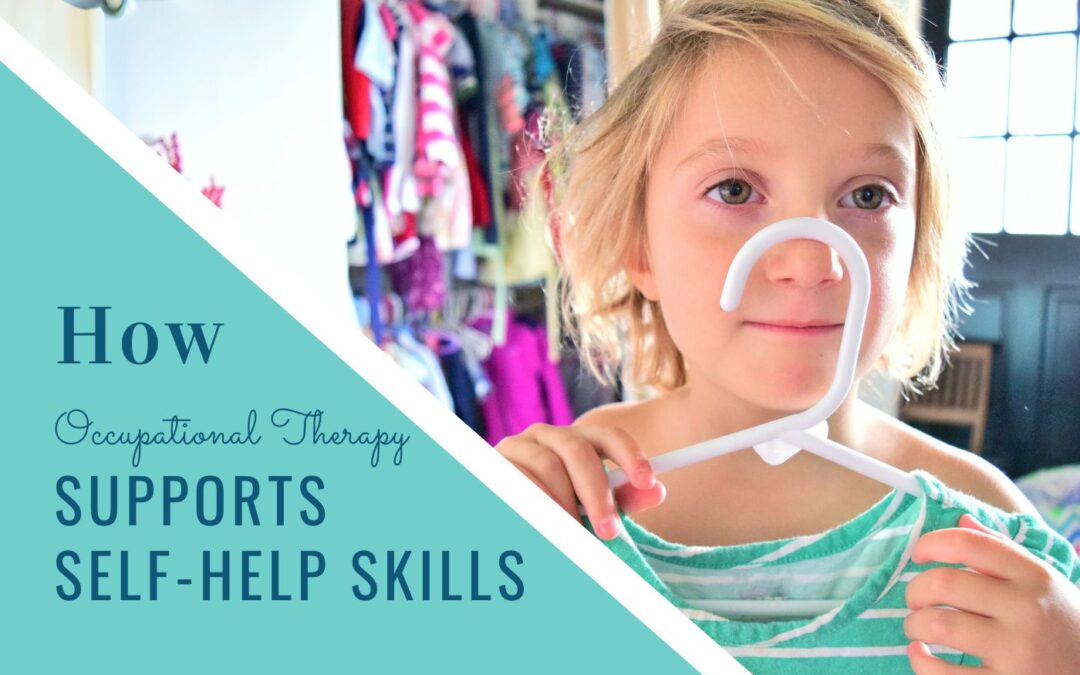Mastering skills like dressing, eating, or using the toilet are significant milestones in a child’s development. Yet, for some children, developing these self-help skills can feel challenging, whether due to developmental differences, sensory processing differences, or other needs. This is where occupational therapy (OT) can make a valuable difference, focusing on skill development, tools and individualized strategies to foster growth and independence.
Understanding Self-Help Skills
Self-help skills are essential life skills that include activities such as:
- Getting dressed
- Nourishing oneself through eating and meal preparation
- Using the toilet independently
- Participating in hygiene routines such as brushing teeth or washing hands
These foundational skills help children gain a sense of autonomy and confidence while preparing them for daily routines at home, school, and in social settings. However, not every child develops these skills at the same pace or through the same methods, which is where individualized support becomes essential.
How Occupational Therapy Helps Foster Independence
Occupational therapy is often thought of as “learning through doing.” For children, this means working on practical, everyday skills in fun and engaging ways that align with their unique abilities, needs and areas of interest. Here’s how OT supports self-help skills:
1. Mastering Dressing Skills
Getting dressed can be tricky for many children due to fine motor challenges, coordination difficulties, sensory sensitivities (e.g., discomfort with certain textures) or environmental factors. Occupational therapists break this process into smaller, manageable steps, teaching techniques to successfully do up a zipper, manage buttons, or stay on task. Therapy sessions may incorporate interactive games or activities as direct intervention for skill development as well as co-creating environmental strategies to support dressing at home and school.
2. Supporting Patterns of Eating
Learning to nourish oneself involves more than just using utensils. It can also mean working through sensory aversions (e.g., specific textures or smells of foods), meeting movement sensory needs to sit at the table, developing oral motor skills, or building confidence in feeding routines. An occupational therapist might guide a child using playful exploration of foods, modified utensils for easier handling, or consistent routines to make mealtimes smoother and more successful.
3. Toilet Training with Confidence
Toilet training is often a source of stress for parents and caregivers, especially when a child experiences fear, challenges with body awareness, or difficulty planning the steps involved. Occupational therapists can create individualized toilet training plans focused on readiness, sensory preferences, and positive reinforcement. This may include visual schedules, fun bathroom routines, and sensory-friendly supports.
4. Building Executive Functioning Skills
Occupational therapists also help children manage the executive functioning skills they need to complete self-help tasks. This includes creating routines, following multi-step instructions, and expanding regulation skills. For children who may struggle with transitioning between activities or staying focused, occupational therapy can introduce individualized tools to support them in the areas they need (e.g., visual schedules, timers, and role-playing strategies).
5. Sensory Processing for Success
For some children, sensory processing differences can make seemingly simple self-help tasks overwhelming. An OT will identify strategies to fit a child’s specific sensory needs before, during and after tasks to help them participate in a positive way. For instance, offering specific tools for the different sensory systems during hygiene routines, or suggest adaptions like seating to provide stability during dressing.
Individualized, Child-Centered Care
One of the most remarkable aspects of occupational therapy is how deeply it focuses on the individual child. Every child’s strengths, challenges, and preferences are unique, so therapy sessions are customized to reflect those needs. By tailoring strategies and building on a child’s existing strengths, OTs provide a compassionate, affirming approach that sets children up for long-term success.
Parents and caregivers are also supported throughout the process. You’ll receive guidance on ways to foster self-help skills at home, tools to build routines, and personalized solutions that fit into your family’s daily life.
Why Self-Help Skills Matter
Milestones like dressing independently or confidently managing hygiene routines aren’t just about the tasks themselves. They represent broader personal growth and encourage the following:
- Confidence: Feeling capable in daily routines builds a child’s self-esteem.
- Independence: Mastering self-help skills enables children to feel more autonomous.
- Social Participation: Engaging in daily activities helps children feel included in group environments at school or with peers.
- Parent-Child Bonding: Working together on these milestones can deepen the connection between parents and children.
If your child struggles with self-help skills, remember that with the right support and techniques, forward progress is possible.
Take the Next Step with Us
We know that every child is unique, and we’re here to support yours with patience, understanding, and expert care. Our occupational therapists specialize in helping children achieve independence through personalized strategies for dressing, eating, using the toilet, and more.
Whether you are just getting started or have been navigating challenges for a while, we’d love to work with you. Book an initial consultation with our friendly team today and discover the next steps toward fostering growth, confidence, and independence for your child.
[Book a Consultation Now]
Your little one’s milestones are worth celebrating, and we’re here to help every step of the way.

